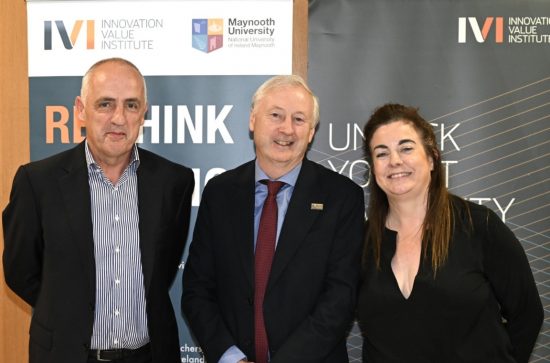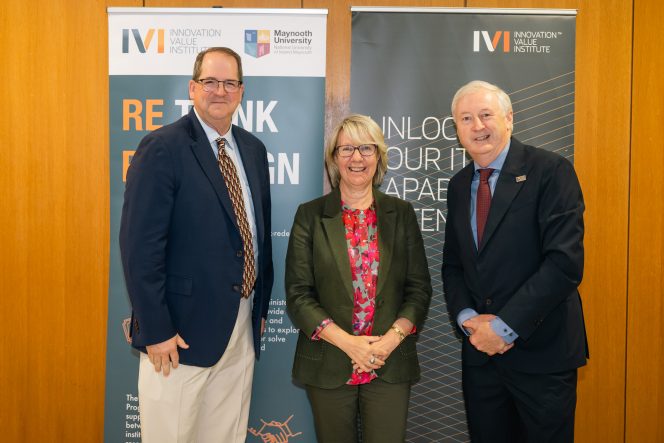
Maynooth University’s Digital Health Summer School announced the launch of an innovative digital platform hosting an extensive ‘Living Lab’ for secure, shared electronic health records, real-time communications, and the storage of medical assessments.
Developed over a five-year period in collaboration with 50 Health Service Executive (HSE) clinicians and social care workers, the Digital Health Spine Living Lab is already supporting a community of more than 15,000 vulnerable people with complex care needs, in more than 180 distributed locations.
Ireland is ranked at the lowest level of EU Digital Health Maturity, with a score of zero, coming in far behind the second last placed, currently Czech Republic at 47%, as measured by the percentage of citizens with access to their electronic health records.
Professor Martin Curley, Director of the Digital Health Ecosystem at Maynooth University’s Innovation Value Institute (IVI) said the platform is now ready for scaling as a national solution.
“The ‘Digital Health Spine Living Lab’ gives clinical teams full 360-degree visibility into a patient’s electronic patient records in real-time, allowing better care to be delivered in the right place and in the right time, fully aligned with the Sláintecare strategy. This digital health solution whose development was led by clinicians, in response to very challenging health needs of patient cohorts such as the homeless, Roma and International Protection applicants is now ready for scaling as a national solution,” Professor Curley said.
“We are one of the few remaining countries with no centralised electronic health records. The more we delay, the more people die prematurely. We are now ready to leapfrog to a new era of care with the announcement of this digital platform. Because the solution is primarily open-sourced based, it is far more cost efficient and can be improved much more rapidly than similar commercial solutions.”

In an address to the Summer School, the OECD’s Head of Digital Health Eric Sutherland, identifies Ireland as having the lowest health digital and data maturity of the OECD countries.
The HSE Social Inclusion Services has been piloting and operating an electronic health record and associated digital health services with clinicians and social workers, based on the Digital Health Spine model, to support people who are homeless, from the Roma community, from the Ukrainian refugee community as well as International Protection applicants, within the region of Dublin South, Kildare and West Wicklow.
The Digital Health Spine (DHS) is modelled on the UK’s NHS Spine, and can provide the architecture of digital health services and a platform to underpin a 21st century healthcare system in Ireland. At the core of the Spine is an individual electronic health record for every citizen in the country, implemented on the open source OpenEMR platform. This platform is certified by the US Office of the National Coordinator for Health Information Technology (ONC) and is used by clinicians in locations around the world.
HSE Service Director of Social Inclusion clinical response teams in the region, Maxine Radcliffe, demonstrated the electronic records system to national and international health experts and clinicians attending the Digital Health Summer School.
"It is unimaginable that in 2024, patients and clinicians in Ireland do not have access to electronic health records as a standard part of care. We have implemented the Response for Vulnerable People (RVP) solution which is providing effective clinical care for over 15,000 people with complex care needs,” she said.
Professor Colin Doherty, Head of the Trinity College Medical School and consultant at St James Hospital, said: “It’s now abundantly clear that data saves lives. We urgently need to address the failure of this country to properly digitise our health system. No more excuses. No more delays. Let’s just do it.”
The Joint Oireachtas Committee on Social Protection, Community and Rural Development, chaired by Denis Naughten, TD, a former Chair of the Oireachtas Committee on Health, has been briefed on the project and chaired a recent Leinster House briefing led by Prof Curley on the ambition and ability of Ireland to leapfrog to an advanced digital healthcare system.
Expressing his support, Deputy Naughten said: “The demonstration at Maynooth University Summer School of a proposed new national digital health spine for Ireland with an electronic health record for everyone in the country is a great leap forward. It will dramatically accelerate the implementation of Sláintecare, pave the way for better health care and a more efficient and effective health system, leveraging the investment made by the National Broadband programme.”
Discussing the Digital Health Spine model, Richard Jones, President of C2-AI, a leading AI health company in Cambridge, UK, said: “In the UK, the NHS Spine is critical as a centralised data repository which enables interoperability, efficiencies, communication with patients and apps from prescribing through to appointment setting. Ireland moving to a similar approach would help leapfrog the system forward towards the world-class healthcare system it wishes to have.”
OpenEMR Foundation Board Chair, Stephen Waite said: “In furtherance of our mission, that all people have access to high-quality medical care through free software, the OpenEMR Foundation is excited to wholeheartedly support the efforts currently underway in Ireland to pilot and further the adoption of OpenEMR and transform the digital healthcare ecosystem. The OpenEMR community has been following the successful deployment of OpenEMR, the most popular free and open-source electronic health records, in Dublin Midlands. We hope that our combined efforts will continue to provide better health care throughout the world, starting in Ireland.”
Chairman of the Irish Patients Association, Stephen McMahon, said: "We are embarking on a great new project in Irish healthcare, to move and stay left, shift left and get 10X (10 times) better health system performance from that strategic decision. The core building block we need for this is an electronic patient health record.”
The Second International Digital Health Summer School at Maynooth University featured Irish and global keynote speakers, including Dr Colm Henry, HSE Chief Clinical Officer, CHIME President Russ Branzell, NHS specialist Dr Amar Ahmed, and Director General at Environmental Protection Agency (EPA) Dr Laura Burke.
A new Digital Health Association was announced, modelled on the Harvard Grand Coalition model, to govern and orchestrate the ecosystem leading the ongoing development and deployment of the spine and associated platform. Gerard Corcoran was announced as the new secretary general with Prof Martin Curley serving as the inaugural President.

